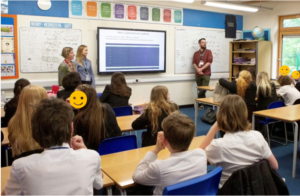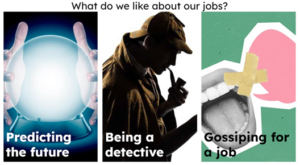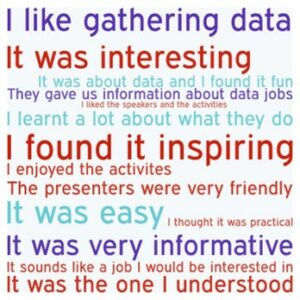I recently took a trip back in time to a Year 8 classroom, a place I didn’t expect to find myself back in quite so soon. As a Junior Researcher on the Research & Citizen Insight team I have now been enjoying my role at Essex County Council for the past 9 months. In May I had the opportunity to visit Notley High School to take part in Essex County Council’s career insight day. Being part of this day was very important to me as I remember being a Year 8 myself and knowing little to nothing about the possibilities of ever working in data or research.
Myself and Katerina from the Research & Citizen Insight team collaborated with Tom from the Data & Analytics team to deliver a joint presentation and workshop activities. The day involved speaking to over 200 Year 8 pupils across the day, whilst students also participated in workshops from the Public Health, Transformation & Delivery, Adult Social Care and Active Essex teams.

To get started we tried to debunk some common misconceptions about our work. Believe it or not, working with data doesn’t just involve coding all day every day. Instead, we revealed what a day in the life of a researcher or an analyst might actually look like and the variety of different tasks we would be involved in. For example, reviewing literature, meeting with colleagues to discuss projects, data visualisation, data cleaning, facilitating focus groups and theming interview responses.
Our presentation also covered some key points to help further demystify our jobs such as:
- Explaining the importance of insight teams within the council to help answer questions and inform decision making.
- The project lifecycle for both researchers and analysts.
- What we enjoyed most about our jobs – such as using data to help predict the future.
- The perks of working in research or data – for example high demand for our professions and an abundance of job opportunities.
- The perks of working for ECC – in particular flexible working and work life balance.
- The different routes you could take into our careers.

We also explained some of the main differences between researcher’s and data analyst’s roles. Importantly highlighting that although we both help to answer questions, the methods we use to answer these questions can be very varied.
To help bring these differences to life, we conducted two mini workshop activities with the students.
- Thematic analysis – Students sorted responses that were gathered from our recent youth vaping survey into different themes. This helped give students a quick taster into thematic analysis, a method used to analyse qualitative data.
- Data visualisation – Teams of students raced to answer questions with two versions of the same data – one visualised well, and one visualised… less well. This exercise helped to emphasise the importance of effective data visualisation and story-telling.
After listening to our presentation and participating in the activities, students completed feedback forms about how they found our session which included lots of positives such as finding it inspiring, informative, and fun.

Moreover, feedback specifically about what the students had learnt included that ‘data and analysis isn’t just numbers’ and that ‘data can be in pictures’. Hopefully challenging some of their previous misconceptions.
All in all, the career insight day helped shine a light on the vast variety of different career options available at Essex County Council. Our session in particular helped students to understand what it means to be a researcher or a data analyst for local government and how our work can help make a difference to the lives of Essex residents.
Not only this but we promoted our professions more widely, highlighting that almost any organisation you can think of will need researchers and analysts helping to guide their decision making, meaning the opportunities available really are endless.
#EssexResearch #EntryToWork #CareerInsightDay
1 comment
Comment by Vicki James posted on
Love this! So great to see people that work in back office Council roles getting involved with our communities and helping young people learn more about the opportunities available to work in data and research.